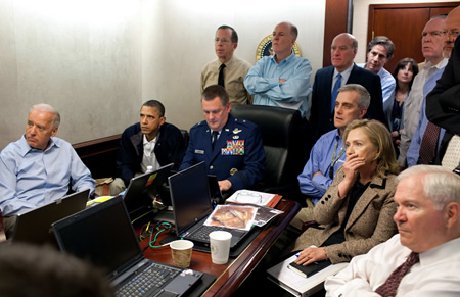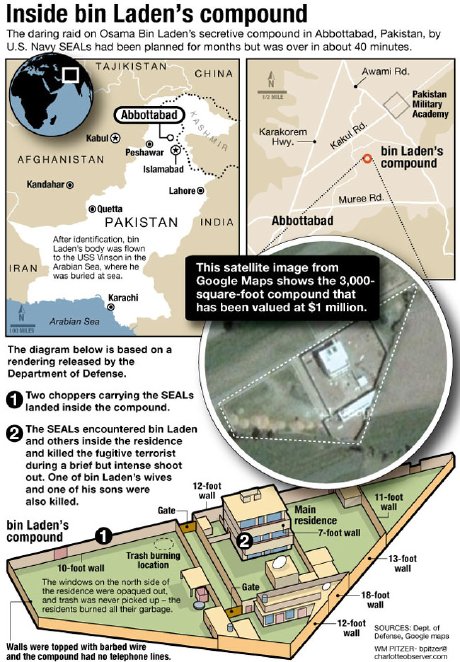Adil Najam
What do Pakistanis think about how Osama Bin Laden met his end, the implications of that end?
There are as many opinions on what happened in Abbottabad as there are Pakistanis. Maybe more. But there is no sense whatsoever where the government of Pakistan (or any of its major institutions) stand on what happened – or stood when it was happening. For 36 hours now the world has been waiting to see what Pakistan does and says – the silence and incoherence from Islamabad has not just been embarrassing, it has been damning. Finally, key institutions in Pakistan have begun trying to piece a narrative together – unfortunately it is way too late and the narrative itself rather lame.
When I put up a short post on Osama Bin Laden’s death soon after the news broke, I had hoped that in time more details would become available and we would get more clarity on what happened and how. We do now have more detail. But certainly not more clarity. The story about what happened in Abbottabad now lives in Spin-abad. Everyone – from governments, secret agencies, the media, the Twitterati, and your spinster aunt – are taking a spin. Many are taking multiple, sometimes contradictory, spins. Everyone except the Pakistan government.
That, of course, is a surprise – not only because the Pakistan government does have a lot of explaining to do, but even more because it is in the interest of the Pakistan government to do that explaining itself rather than have someone else do it for them. Yet, up until it was already too late, Pakistan seems to have abdicated that responsibility. In fact, President Barack Obama, Secretary Hillary Clinton and Senator John Kerry seemed to be making that (half-hearted) case for Pakistan more than anyone in authority in Pakistan. Given that President Obama had informed President Zardari before the speech from the US President, one would have assumed that the Pakistan President and his media handlers would have their own statement ready to go on the air minutes, if not seconds, after President Obama’s speech. This is not about spin and PR, this is Diplomacy 101: Own and define the narrative as soon and as clearly as you can before someone else defines it for you – especially if the narrative is likely to be unfavorable.
But the narrative, itself, is not the core of Pakistan’s challenges. The problem is the facts on the ground and the government’s inability and unwillingness to explain them. Pakistan is used to the feeling of the world ganging up on it. But there are good reasons for the questions being asked of Pakistan by the world today. There are even better reasons for the questions being asked of Pakistan by Pakistanis today. Whether the government comes clean to the world or not, it is vital that it respond to Pakistanis. The first is a matter of national image (no trivial issue, that), but the latter is a question of citizen trust in national institutions (an existential element of statehood).
The fact is that there is a Pakistan case to be made on this issue. And it needs to be made to Pakistanis much more than to the rest of the world. It is a case that forcefully stresses that a world, and a Pakistan, without Osama Bin Laden in it is a vastly better world than one with him in it – this is a villain who orchestrated events that have left more than 30,000 Pakistanis dead in extremism and terrorism. It is a case that legitimately highlights the sacrifices that Pakistan and Pakistanis have, in fact, made in the fight against terrorism. Most importantly, it is a case that honestly analyzes what happened in Abbottabad – it is not a surprise that Osama Bin Laden was found in Pakistan and in a large urban area (just like nearly every other major Al Qaida figure captured) – but an explanation is owed on why Pakistani intelligence failed to make the connections that led to him, an explanation is owed on exactly what Pakistan’s official role in the final operation was (or was not), and an explanation is owed on exactly what Pakistan’s strategy on countering terrorism is, who is running it, and why it is not working well enough or fast enough.
In a country and an ‘establishment’ as divided as Pakistan, this cannot be an easy conversation; it is not supposed to be. It is time to ask honest and tough questions of everyone. It has long need a necessary conversation; now is the time to have it.






















































@Sridhar
What are you trying to prove? You have made your point that army knew about the house. Why these repetitions? Just to satisfy your ego to malign Pakistan?
And you talked about Indian police. We almost have the same policing system inherited from the Raj. You can grease their palms and do anything. Don’t say that Indian police is better than Pakistan. We all know that they are the same as here or in other third world countries.
Glad to see some PPP supporters. One thing is for sure in South Asian politics. Supporters of dynastic parties love them despite their heinous crimes. Any impartial person privy to Benazir’s deeds will not call her an angel. She had the blood of 15,000 innocent Mohajirs on her hands. And she was a feudal lady, a major snob, and a corrupt lady. So are other leaders of Pakistan and some generals too.
It is about time that people from lower classes stand up and teach the exploiters a lesson. Don’t allow that stupid kid from Oxford or Nawaz or Shahbaz’s son to rule you. TEACH THEM A LESSON!
The mainstream American media (and I don’t include Fox News in it) has not been suggesting that Pakistanis in general are mourning Osama’s death or exaggerating the images of the the extremist groups such as the JuD who took out public demonstrations. However, they are asking questions about the potential for complicity of the Pakistan Army and the ISI in sheltering OBL for all these years. As any observer within the region knows for a long time, the Pakistan army and the ISI have been hand in glove with many terror organizations. If anything, the American Government and the media in the US downplayed these ties for long. With the kind of evidence of such complicity that has emerged in recent years, they cannot possibly downplay it to the same extent any longer.
Also, some people make the claim that Pakistan, the Pakistan Army and even the ISI itself have been targeted by terrorists and hence by extension could not be complicit any longer with terrorists even if they were hand in glove with them in the past. This may seem compelling to somebody who lumps all the terrorist organizations together, but is an obviously flawed argument to somebody who knows a little more. The organizations that have targeted Pakistani cities, the Pakistan army and its agencies are not the ones the army and the ISI are sheltering. The Afghan Taliban, the Haqqanis, the LeT, even elements of the Al Qaeda have been historically nurtured and continue to receive sustenance from the Pakistan army and its agencies, most notably the ISI. The organizations like TTP and some others who have turned against Pakistan in recent times are not the same as the above – the people involved are different, and their areas of operation and sphere of influence are different. Pakistan has not acted against the organizations it still nurtures, and it has not been targeted by them.
and the biggest question of all. why should i rejoice upon his death (when most credible of the independent researches have shown 9-11 to be an inside Job on the American govt’s part) they say he is indirectly responsible for killing of 36000 of our citizens but then ..U.S.A is directly responsible for the killing. i should hate them more.
and i am no terrorist in the making. i am stating simple facts and questions that ravage my mind.
as a medical student i have a query. it is impossible for a patient of kidney failure to survive without a dialysis or transplant for so many years. OBL has had this end-stage-renal disease since late 1990s. can anyone explain the absence of a dialysis machine in the so called OBL-mansion?